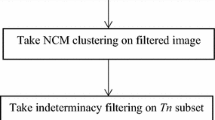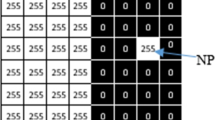Abstract
The traditional FCM algorithm is developed on the basis of classical fuzzy theory, though the classical fuzzy theory has its own limitations. The lack of expressive ability of uncertain information makes it hard for FCM algorithm to handle clustered boundary pixels and outliers. This paper proposes a Neutrosophic C-means Clustering with Local Information and Noise Distance-based Kernel Metric for Image Segmentation (NKWNLICM). The concept of local fuzzy information and noise distance in the Neutrosophic C-means Clustering Algorithm (NCM) is introduced in the paper. The algorithm improves the efficiency by leaving out parameter setting for different noises when segmenting pictures, and it also improves the robustness. Simulation results show that the algorithm has better segmentation results for noisy images.
Access this chapter
Tax calculation will be finalised at checkout
Purchases are for personal use only
Similar content being viewed by others
References
Hong, R., Zhang, L., Zhang, C., et al.: Flickr circles: aesthetic tendency discovery by multi-view regularized topic modeling. IEEE Trans. Multimed. 18(8), 1555–1567 (2016)
Hong, R., Zhang, L., Tao, D.: Unified photo enhancement by discovering aesthetic communities from Flickr. IEEE Trans. Image Process. 25(3), 1124–1135 (2016)
Hong, R., Hu, Z., Wang, R., et al.: Multi-view object retrieval via multi-scale topic models. IEEE Trans. Image Process. 25(12), 5814–5827 (2016)
Miyamoto, S., Ichihashi, H., Honda, K.: Algorithms for Fuzzy Clustering. Studies Fuzziness Soft Computing, vol. 229 (2008). https://doi.org/10.1007/978-3-540-78737-2
Bezdek, J., Hathaway, R., Sobin, M.: Convergence theory for fuzzy c-means: counterexamples and repairs. IEEE Trans. Syst. Man Cybern. 17(5), 873–877 (1987)
Chuang, K.S., Tzeng, H.L., Chen, S.: Fuzzy c-means clustering with spatial information for image segmentation. Comput. Med. Imaging Graph. 30(1), 9 (2006)
Dave, R.N.: Characterization and detection of noise in clustering. Pattern Recognit. 12(11), 657–664 (1991)
Krinidis, S., Chatzis, V.: A robust fuzzy local information C-means clustering algorithm. IEEE Trans. Image Process. Publ. IEEE Signal Process. Soc. 19(5), 1328–1337 (2010)
Gong, M., Liang, Y., Shi, J.: Fuzzy C-means clustering with local information and kernel metric for image segmentation. IEEE Trans. Image Process. 22(2), 573–584 (2013)
Cuo, Y.H., Sengur, A.: NCM: neutrosophic C-means clustering algorithm. Pattern Recognit. 48(8), 2710–2724 (2015)
Jian, M., Qi, Q., Dong, J., Yin, Y., Lam, K.M.: Integrating QDWD with pattern distinctness and local contrast for underwater saliency detection. J. Vis. Commun. Image Represent. 53, 31–41 (2018)
Kim, S., Chang, D.Y., Nowozin, S.: Image segmentation using higher-order correlation clustering. IEEE Trans. Pattern Anal. Mach. Intell. 36(9), 1761–1774 (2014)
Smarandache, F.: Neutrosophy: Neutrosophic Probability, Set, and Logic: Analytic Synthesis and Synthetic Analysis. Philosophy, Cambridge (1998)
Zhang, H., Fritts, J.E.: Entropy-based objective evaluation method for image segmentation. In: Proceedings of Spie, vol. 5307, pp. 38–49 (2003)
Acknowledgments
This work has been supported in part by the National Natural Science Foundation of China (Grant No. 61773220, 61502206), the Nature Science Foundation of Jiangsu Province under Grant (No. BK20150523)
Author information
Authors and Affiliations
Corresponding author
Editor information
Editors and Affiliations
Rights and permissions
Copyright information
© 2018 Springer Nature Switzerland AG
About this paper
Cite this paper
Lu, Z., Qiu, Y., Zhan, T. (2018). Neutrosophic C-means Clustering with Local Information and Noise Distance-Based Kernel Metric Image Segmentation. In: Hong, R., Cheng, WH., Yamasaki, T., Wang, M., Ngo, CW. (eds) Advances in Multimedia Information Processing – PCM 2018. PCM 2018. Lecture Notes in Computer Science(), vol 11164. Springer, Cham. https://doi.org/10.1007/978-3-030-00776-8_16
Download citation
DOI: https://doi.org/10.1007/978-3-030-00776-8_16
Published:
Publisher Name: Springer, Cham
Print ISBN: 978-3-030-00775-1
Online ISBN: 978-3-030-00776-8
eBook Packages: Computer ScienceComputer Science (R0)




